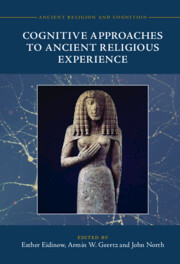
-
Select format
-
- Publisher:
- Cambridge University Press
- Publication date:
- July 2022
- August 2022
- ISBN:
- 9781009019927
- 9781316515334
- 9781009011600
- Dimensions:
- (228 x 152 mm)
- Weight & Pages:
- 0.59kg, 314 Pages
- Dimensions:
- (229 x 152 mm)
- Weight & Pages:
- 0.456kg, 314 Pages
- Subjects:
- Ancient History, Classical Studies, Religion, Church History
- Series:
- Ancient Religion and Cognition
You may already have access via personal or institutional login- Subjects:
- Ancient History, Classical Studies, Religion, Church History
- Series:
- Ancient Religion and Cognition
Book description
For some time interest has been growing in a dialogue between modern scientific research into human cognition and research in the humanities. This ground-breaking volume focuses this dialogue on the religious experience of men and women in the ancient Greek and Roman worlds. Each chapter examines a particular historical problem arising from an ancient religious activity and the contributions range across a wide variety of both ancient contexts and sources, exploring and integrating literary, epigraphic, visual and archaeological evidence. In order to avoid a simple polarity between physical aspects (ritual) and mental aspects (belief) of religion, the contributors draw on theories of cognition as embodied, emergent, enactive and extended, accepting the complexity, multimodality and multicausality of human life. Through this interdisciplinary approach, the chapters open up new questions around and develop new insights into the physical, emotional, and cognitive aspects of ancient religions.
Reviews
‘… this volume makes important and interesting reading for all who are interested in learning more about ancient religious experience and rituals, and I personally greatly appreciated it …’
Anne L. C. Runehov Source: Reviews in Science, Religion and Theology
Contents
Metrics
Altmetric attention score
Full text views
Full text views help Loading metrics...
Loading metrics...
* Views captured on Cambridge Core between #date#. This data will be updated every 24 hours.
Usage data cannot currently be displayed.
Accessibility standard: Unknown
Why this information is here
This section outlines the accessibility features of this content - including support for screen readers, full keyboard navigation and high-contrast display options. This may not be relevant for you.
Accessibility Information
Accessibility compliance for the PDF of this book is currently unknown and may be updated in the future.


